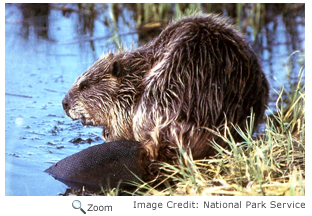Castoridae - beavers
 There are two species in this family, the American beaver and the
Eurasian beaver. Beavers spend a lot of time in the water and have many adaptations that help them thrive in an aquatic environment. They have thick, waterproof fur and webbed hind feet that it uses to propel itself through the water. When the beaver is under water, its nose and ears close up, and a special membrane covers its eyes. Beavers have flat tails and long, sharp upper and lower incisor teeth that they use to cut into trees and woody vegetation. Like the incisors in all rodents, these teeth grow throughout the beaver's life.
The American beaver is North America's largest rodent. It is found throughout North America, except for the northern most parts of Canada, parts of Florida, the desert Southwest, and Mexico. The Eurasian beaver is found from northern Europe east to Siberia. It is the largest rodent in Europe. It looks like the American beaver. The Eurasian beaver is more likely to live in a burrow than a lodge. There are two species in this family, the American beaver and the
Eurasian beaver. Beavers spend a lot of time in the water and have many adaptations that help them thrive in an aquatic environment. They have thick, waterproof fur and webbed hind feet that it uses to propel itself through the water. When the beaver is under water, its nose and ears close up, and a special membrane covers its eyes. Beavers have flat tails and long, sharp upper and lower incisor teeth that they use to cut into trees and woody vegetation. Like the incisors in all rodents, these teeth grow throughout the beaver's life.
The American beaver is North America's largest rodent. It is found throughout North America, except for the northern most parts of Canada, parts of Florida, the desert Southwest, and Mexico. The Eurasian beaver is found from northern Europe east to Siberia. It is the largest rodent in Europe. It looks like the American beaver. The Eurasian beaver is more likely to live in a burrow than a lodge.
World Status Key
 Least Concern Least Concern  Near Threatened Near Threatened  Vulnerable Vulnerable  Endangered Endangered  Critically Endangered Critically Endangered  Extinct in the Wild Extinct in the Wild  Extinct Extinct
Status and range is taken from ICUN Redlist. If no status is listed, there is not enough data to establish status.
US Status Key
 Threatened in US Threatened in US  Threatened in NH Threatened in NH  Endangered in US Endangered in US  Endangered in NH Endangered in NH  Introduced Introduced
Status taken from US Fish and Wildlife and NH Fish and Game
New Hampshire Species |
|
North/Central American Species |
American Beaver - Castor canadensis  |
|
None
|
Additional Information
Key:  Profile Profile  Photos Photos  Video Video  Audio Audio
American Beaver - Castor canadensis      
The American beaver usually rises at sundown and returns to its lodge at sunrise.
Source: Arkive Intended Audience: General Reading Level: Middle School
American Beaver - Castor canadensis     
The American beaver is the national animal of Canada.
Source: National Zoo Intended Audience: Students Reading Level: Middle School
American Beaver - Castor canadensis     
American beavers are monogamous.
Source: Animal Diversity Web Intended Audience: General Reading Level: Middle School
American Beaver - Castor canadensis     
Young beavers are called kits. They leave the family colony when they are six months old.
Source: Smithsonian Museum of Natural History Intended Audience: General Reading Level: Middle School
American Beaver - Castor canadensis     
The beaver can cut down an 8-foot tree in just five minutes.
Source: Oregon Zoo Intended Audience: General Reading Level: Middle School
American Beaver - Castor canadensis      
The beaver's life span in the wild is 10-12 years.
Source: Minnesota Zoo Intended Audience: Students Reading Level: Middle School
Eurasian Beaver - Castor fiber     
The Eurasian beaver was once found throughout Europe and Asia. It was almost hunted to extinction for its fur and castoreum.
Source: Arkive Intended Audience: General Reading Level: Middle School
Eurasian Beaver - Castor fiber     
Eurasian beavers build lodges made of sand and clay in river banks.
Source: Boreal Forest Intended Audience: General Reading Level: Middle School
Eurasian Beaver - Castor fiber     
Eurasian beavers live in small family groups.
Source: Animal Diversity Web Intended Audience: General Reading Level: Middle School
|

